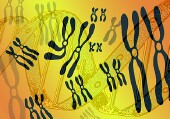
TUESDAY, June 15 (HealthDay News) — A severe and potentially deadly digestive tract disorder in infants may have a genetic component, finds a new study from Denmark.
Pyloric stenosis, a birth defect that typically affects infants two to eight weeks old, involves an inability to pass food from the stomach into the duodenum, part of the small intestine. The condition is the most common reason for surgery in the first months of life. Among whites, there are 1.5 to 3 cases of pyloric stenosis per 1,000 live births.
This study of nearly two million children born in Denmark between 1977 and 2008 found that pyloric stenosis is more common among twins and siblings. During the study period, 3,362 of the children had surgery for the birth defect. The researchers found that 46 percent of children with an affected identical (monozygotic) twin and 7.7 percent of children with an affected fraternal (dizygotic) twin also had pyloric stenosis.
The findings highlight a strong family risk of pyloric stenosis, with a nearly 200-fold increased risk among identical twins and a 20-fold increase among siblings. Even more distant relatives had an increased risk, the researchers said.
“Our findings argue for a hereditary component of pyloric stenosis,” wrote Dr. Camilla Krogh, of the Statens Serum Institute in Copenhagen, and colleagues, in a news release. Not only was it predominant in boys, the risk was higher among identical twins and fraternal twins and cropped up among even third-degree relatives. There was a difference in risk between siblings and half-siblings (and cousins and half-cousins), and there was “a heritability [estimate] of 87 percent,” whose most likely explanation was shared genes that affected individuals’ responses to various factors after birth, Krogh noted.
The researchers conclude that “the high rates for twins and siblings should be considered in counseling families with affected children.”
The study appears in the June 16 issue of the Journal of the American Medical Association.
More information
The Nemours Foundation has more about pyloric stenosis.

